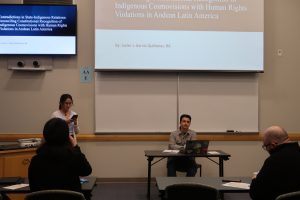Contributed by Javier Garcia
Contradictions in State-Indigenous Relations: Reconciling Constitutional Recognition of Indigenous Cosmovisions with Human Rights Violations in Ecuador and Colombia
Abstract
This research examines the contradictions in state-Indigenous relations in Andean Latin America, with a focus on Ecuador and Colombia as comparative case studies. While both countries constitutionally recognize Indigenous rights—including the principle of Free, Prior, and Informed Consent (FPIC)—their implementation diverges significantly, revealing persistent human rights violations amid rhetorical commitments to Indigenous cosmovisions. Ecuador was selected for its robust constitutional inclusion of Indigenous principles, such as Buen Vivir (Sumak Kawsay) and plurinationalism, which explicitly protect Indigenous autonomy, land rights, and FPIC (as outlined in the 2008 Constitution). Despite these guarantees, the state continues to prioritize extractive industries, undermining Indigenous sovereignty through policies that bypass meaningful consultation. Cases like Sarayaku v. Ecuador and the Sinangoe community’s legal victories highlight this gap, demonstrating how Indigenous groups must resort to litigation to enforce FPIC despite constitutional promises. Colombia, by contrast, offers a less comprehensive framework, with its 1991 Constitution recognizing a plurinational identity but lacking explicit integration of Indigenous cosmovisions. While FPIC is theoretically protected under international law (e.g., ILO Convention 169), state practices often marginalize Indigenous voices, particularly in resource conflicts. The “Ley General Forestal” case exemplifies how Indigenous and Afro-descendant communities must rely on judicial activism to assert their rights, revealing systemic state resistance to meaningful consultation.

Through a comparative analysis of legal texts, court rulings, and Indigenous resistance movements, the project highlights the gap between constitutional rhetoric and state practices. The study argues that constitutional recognition in both countries functions as a symbolic concession, obscuring structural economic dependencies on extractivism that perpetuate rights violations. By analyzing legal cases, Indigenous mobilizations, and policy contradictions, the research underscores the limits of legal pluralism in postcolonial states. These cases were chosen due to their contrasting constitutional approaches within a manageable scope, with future research intended to expand to other Andean nations. The findings contribute to debates on Indigenous self-determination, state accountability, and the tension between developmentalist policies and rights-based frameworks.